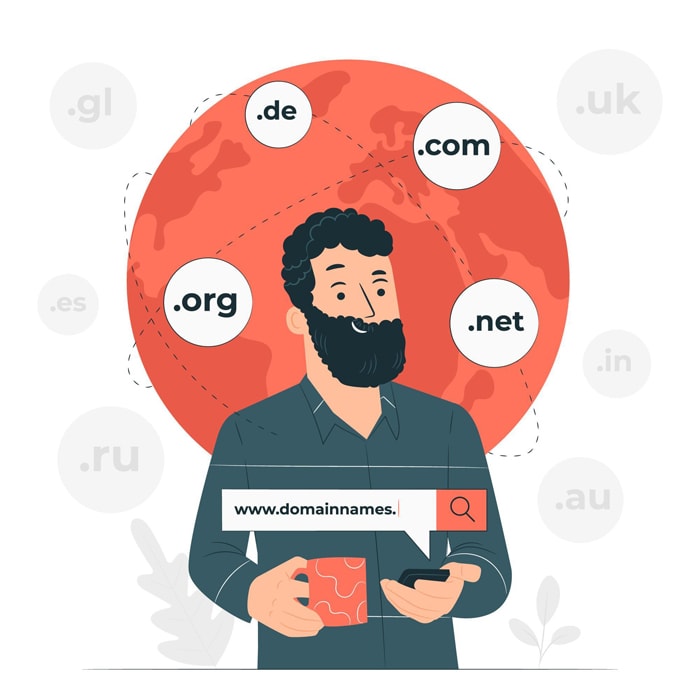The first thing visitors learn about your website is its domain name, which serves as both the public face and the name of your online brand. Every domain name is distinct, but the best ones are relevant, familiar, and simple to recall. To pique the interest of customers, select a domain with an appropriate domain extension. If you are concerned about the effects of domain extension on SEO, consider consulting with an SEO expert first. In this post we have shared all that you need to know while comparing Com vs Net vs Org.
A domain extension might appear only as a short snippet of text but is critical to your online presence, as it shapes how visitors perceive your brand even before they reach your homepage, regardless of whether it is “.com”, “.org”, “.net”, or any other extension. Contrary to popular belief, domain extension has nothing to do with website designing. It will depend on your website structure, goals, and several other factors.
What is the Meaning of a Domain Extension?

Every domain name has two parts: the name and the extension. These constitute the “address” of your website on the internet.
The name, also known as the second-level domain, is the website’s unique identifier. The second-level domain is followed by the domain extension. Domain extensions are also known as top-level domains, or TLDs. These terms are frequently used interchangeably.
The domain extension specifies the entity that your website represents, whereas the second-level domain indicates the name of your brand.
Types of Domain Extensions
When looking for a suitable TLD option for your site, you should be aware of three types of domain extensions:
- Generic
- Sponsored
- Country code
Now that you know about the types of domain extensions, let’s now know more about them in detail.
Generic Domain Extensions
This is the most common type of extension, and it is what most online businesses use in their domain names. Generic domain extensions are available for purchase by any website, and some are even available for free. The popular extensions.com,.org, and.net, as well as many other niche TLDs, are generic.
Sponsored Domain Extensions
Sponsored domain extensions are only available to organizations that meet certain criteria. For example, only accredited educational institutions can use the .edu domain extension for their websites, while the.gov extension is only available to entities affiliated with the government of a country.
Country Code Domain Extensions
Many countries have their own two-letter domain extension to indicate the location of the organization. Examples include .us (United States), .in (India), and .uk (United Kingdom).
Common Domain Extensions

Domain extensions were originally designed to categorize websites based on the type of organization. The idea was that all websites could be divided into three categories: entity (the “top-level”), organization name (the “second-level”), and website section (via subdomains).
Some of this logic still holds true, but the domain extension system has relaxed its rules over time. There are now over 1,000 different domain extensions available, and some classic extensions are being used by sites for purposes other than their original purpose. Here are a few popular options:
.com
The.com domain extension is an abbreviation for “commercial.” When it was first introduced,.com was intended for ecommerce sites. It is now the most commonly used domain extension, accounting for more than half of all websites. Many consider it the default domain extension, and its widespread use makes it the first choice for most online businesses, organizations, personal websites, and blogs.
The .com extension has only one disadvantage, but it is a significant one: availability. There is a good chance that the perfect .com domain name for your company has already been taken. After .com, .net is the second most popular TLD. It is an abbreviation for “network” and was designed for websites that specialize in network-based technology, such as ISPs, email services, and database services.
.net
In recent years,.net has occupied the same domain space as.com. If their preferred.com domain is already taken, some businesses choose this extension.
.org
This TLD was created for and is only available to nonprofit organizations, hence the suffix “.org.” While this restriction was recently lifted, the original intent remains, .org is commonly used by foundations and charities, educational services, open-source software projects, and other non-profit organizations. A.org extension can be used by any website, but for many people,.org implies that the organization behind the domain is non-commercial.
.co
To address the scarcity of desirable.com domain names, the.co extension was introduced in 2010. It is an abbreviation for “company” or “corporation.” .co, like.com and.net, is the most popular domain among online businesses. It’s worth noting that the.co TLD is frequently combined with country code domain extensions (e.g.,.co.uk), and it is also the country’s official domain extension. Nonetheless, .co is most commonly recognised globally as an alternative to .com or .net.
.biz
As the name suggests,.biz is only for online businesses. It is the least popular extension on this list, but it is also the least expensive. Despite being a generic domain extension, the .biz TLD is only available for business and ecommerce websites.
How to Pick the Best Domain Extension

Consider websites that use the extensions .com, .org, and .net; these extensions are likely to carry different meanings and set different expectations for you. It is critical to select a domain name with an extension that accurately communicates the nature of your service or organization. When running an online business, .com suffices.
However, with.com’s limited availability, it is not always that simple. If you are unable to secure your desired domain with the.com extension, alternative domain extension options can assist in putting your site on the map.
Let’s draw a comparison between different domain extensions:
com vs net
The two most common domain name extensions for online businesses are .com and .net. When looking for a domain name for your website, look for.com domains first, even if you can’t get your first choice. If you are unable or unwilling to change the name of your website, .net is a viable alternative to .com.
While .net is the second most popular business domain, it is a distant second, with less than 4% of websites using it. This is why you should always consider .com before .net. Its pervasiveness simply cannot be matched. There are numerous benefits to using.com. For one thing, potential visitors are more likely to remember and find your domain if it ends in .com. If you choose .net, many people will likely assume your subdomain is .com and land on a blank page, or worse, a competing website.
A .com domain also conveys professionalism and authority in your field. Any extension other than.com may imply that another company is more established than yours, which reduces visitors’ trust in your service.
Finally, .com has a usability advantage. Smartphone keyboards include a “.com” key that allows users to quickly enter a domain name into their browser. Unfortunately, no other domain extension, including .net, has this option. This may seem insignificant, but even minor inconveniences can have a negative impact on visitors. If you anticipate a high volume of traffic from this channel, do not overlook the mobile browsing experience.
The only reason to choose .net over.com is if a suitable domain with the .com extension is unavailable. If this is the case, consider changing your domain name by adding descriptive words that describe your business or spelling it differently. You could even consider buying the.com domain from the current owner or changing your company name entirely to secure a.com domain.
If none of these alternatives work, then try the .net extension.
Because .net implies that the business is related to computer “networks,” technology companies will face fewer obstacles. The same cannot be said for an ecommerce business, blog, or anything else. These sites must incorporate the.net extension into their branding.
If your desired domain is available with both.com and.net extensions, consider buying both and redirecting your .net domain to your primary .com domain. This will keep users from visiting the wrong site and prevent others from purchasing a similar domain to divert traffic away from you.
For most sites, the choice between.com and.net comes down to availability of .com. If not, you’ll have to choose between finding an alternative domain with.com availability and overcoming the branding challenge of a non .com domain.
org vs com
While both are popular and reliable domain name extensions,.com and.org convey different information about your website. Secure a.org domain if your website represents a non-profit organization. Otherwise, go with.com. If .com is not available for your for-profit website, consider .net instead of.org.
Because .com has always represented commercial websites and .org has always represented for-profit businesses, the appropriate uses of .org and.com are so obvious.
As a result of its solid reputation and availability, .org is an excellent choice for organizations such as NGOs, charities, free online educators and open-source technology platforms. If your organization falls into one of these categories, you can use .org in your branding to increase credibility. You’ll also have an easier time obtaining the desired domain name.
On the contrary, if you associate.org with your for-profit website, you will lose visitors’ trust. When we see “website.org,” most of us assume the website exists to provide free resources or to serve the public. As a result, employing this extension for commercial purposes appears deceptive.
It is perfectly acceptable to obtain both of these extensions for your website in order to protect your online identity. Ensure that all users are directed to the more appropriate domain. Many well-known companies take this precaution; for example, go to starbucks.org or npr.com.
Some companies register both.org and.com domains as separate sites for their nonprofit and for-profit divisions. WordPress’s free CMS is hosted on a.org domain, while its paid site builder and hosting services are hosted on a.com domain.
co vs com
Both .co and .com are browser extensions for online businesses. First and foremost, try to secure a.com extension for your desired domain. If the.com extension is unavailable, .co is a well-known TLD alternative, but it takes more effort to properly brand your website.
As with .net, only use .co as your primary domain if the.com version of your desired domain name is already taken and you are unwilling to find another name for your domain. From a branding standpoint, .co is a better .com alternative than .net, especially for businesses outside of the tech industry. .net denotes network technology, whereas.co does not.
However, before you choose.co, you should be aware of the disadvantages. To begin, .co is only one letter different from .com. This similarity may lead users to assume .com instead, causing confusion when searching for your website. To avoid this, make the “.co” part of your domain clear in your branding.
Second, the average .co domain is more expensive than its .com counterpart. This is to discourage people from purchasing both .com and .co domains at the same time, as well as from purchasing .co domains in bulk. After all, the purpose of .co is to provide more businesses with a suitable domain when .com is insufficient.
If you do not mind these disadvantages, .co is a viable alternative TLD for your online business.
Purchasing both the .com and .co extensions for the same domain, as with .net, prevents competitors from outranking your site with a similar domain.
biz vs com
Though .biz suggests a business website, .com is a better domain extension in almost every case. .com is now more recognisable, trustworthy, and professional than .biz. The .biz extension is widely considered to be of low quality and should be avoided.
Not only does.biz lack the popularity of the .com, .org, .net, and .co extensions; it also presents a significant branding challenge. By naming your website “.business,” you are stating unequivocally that it exists to sell.
Of course, the ultimate goal of all online businesses is to make a profit, but it is critical not to come across as too sales-y to visitors. Your online brand should prioritize the customer experience above all else, which .com, .net, and even .co can do, but .biz cannot.
If you are stuck deciding between .com and .biz, it is time to switch to a different domain name with a better extension. In the long run, you will see more visitors and build a stronger brand.
Is Domain Extension Important for SEO?
When creating or changing a website, it is always a good idea to consider SEO. The generic top-level domain of your website has no bearing on its search engine performance. Your top-level domain influences brand perception and trust more than anything else, but Google states that it does not consider TLD when ranking search results.
To climb the rankings, you are better off implementing other SEO best practices. There is one important caveat here. If two or more websites have the same name and use the same SEO strategy, but have different domain extensions, the website with the .com extension will rank higher in most searches.
This is due to the fact that people trust .com websites and will prefer them over .net or .biz alternatives, and websites with more traffic perform better in search engines. The name component of your domain, unlike the TLD, has an impact on SEO. The name of your website informs visitors and search engines about what your organization is and/or does.
Also Read
- A Comprehensive Website Redesign SEO Checklist 2024
- 10 Best Free Vector Design & Graphic Websites
- A Complete Guide to Digital Marketing
Conclusion
You may rest easy knowing that a .com is best most of the time after comparing .com,.net, and .org domain extensions. However, there are some exceptions, particularly if you work for a non-profit organization, a tech company, or are in a sector or industry where a particular domain extension is desired or required. As it is not always simple to change domain names in the future, we advise you to invest a lot of time in your study.
If you have decided on a domain name and extension and are now looking to move further, we can help you build a fantastic website.
Frequently Asked Questions
Can we use multiple top level domains?
Buying and using multiple top level domains is a common, sensible strategy that most modern companies follow. This allows them to retain domains related to their brand name and prevents any additional cost that they might incur if they have to buy it from someone else.
Does it matter what domain extension you use?
Domain extensions help establish security and trust in a visitor’s mind. They might not have equal importance for search engine optimization, but the user perspective side definitely outruns every other factor that you might be overlooking. As country code TLD can be used for local businesses while a company serving customers across the globe or eyeing global outreach in coming years can use .com or similar extensions.
What does .xyz mean in a Web address?
.xyz is a popular TLD. It was suggested under the New Generic Top-Level Domain (gTLD) Program of ICANN. On June 2, 2014, it was made accessible to the public. The three letters of the domain name were chosen because they are the final in the Latin-script alphabet and to refer to members of generations X, Y, and Z.
What should I know when deciding com vs net?
We have explained it in great details in the post above. Please read.


























 RSS Feeds
RSS Feeds